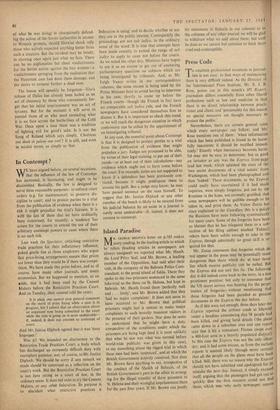In Contempt ?
WE have argued before, on several occasions, that the influence of the law of Contempt has increased, is increasing, and ought to be diminished. Basically, the law is designed to serve three reasonable purposes: to enforce court orders (e.g. for maintenance); to preserve dis- cipline in court; and to protect parties to a trial from the publication of evidence when there is a risk it might prejudice the trial's fairness. It is with the last of these that we have ordinarily been concerned; for recently, a tendency has arisen for the courts to extend the use of their arbitrary contempt powers to cases where there is no such risk.
Last week the Spectator, criticising restrictive trade practices for their inflationary influence, poked gentle fun at those employers who argue that price-fixing arrangements ensure that prices are lower than they would be if there was compe- tition. We have made this point before, and so of course, have many other journals, and many economists. But we happened to mention, as an aside, that it had been used by the Cement Makers before the Restrictive Practices Court. And on Tuesday, their counsel told the court : It is plain one cannot stop general comment on the merit of price fixing while a case is in progress, but I submit that an observation about an argument now being submitted to the court while the case is going on is most undesirable— if, indeed, it does not amount to contempt of court.
And Mr. Justice Diplock agreed that it was 'most Improper.'
Was it? We intended no discourtesy to the Restrictive Trade Practices Court, a body which has discharged an extremely difficult duty with exemplary patience; nor, of course, to Mr. Justice Diplock. We should be sorry if any remark we made should be construed as a reflection on the court's work. But the Restrictive Practices Court is not here sitting as a court of law, in the ordinary sense. It does not exist to try the Cement Makers, or any other federation. Its purpose is to elucidate what restrictive practices a federation is using; and to decide whether or not they are in the public interest. Consequently the proceedings are not sub judice, in the ordinary sense of the word. It is true that attempts have been .made recently to extend the range of sub judice to apply to cases not before the courts. As we noted the other day, Ministers have begun to use it as an excuse to get out of answering parliamentary questions on subjects which are being investigated by tribunals. And, as Mr. Leigh Vance writes in our correspondence columns, the same excuse is being used by the Prime Minister here to avoid having to intervene in his case, shortly to come up before the French courts—though the French in fact have no comparable sub judice rule, and the French newspapers have considered themselves free to discuss it. But it is important to check this trend, or we will reach the dangerous situation in which controversy can be stilled by the appointment of an investigating tribunal.
In any case, the essential point about Contempt is that it is designed to protect parties to a trial from the publication of evidence that might prejudice a jury. Judges are presumed to be able, by virtue of their legal training, to put out of their minds—or at least out of their calculations—any evidence which ought not to have come before the court. For example, juries are not supposed to know if a defendant has been previously con- victed, because it might predispose them to assume his guilt. But a judge may know; he may have passed sentence on the man himself. To suggest that Mr. Justice Diplock or any other member of the bench is likely to be swayed from his judicial balance by an aside in a journal is surely most undesirable—if, indeed, it does not amount to contempt.










































 Previous page
Previous page